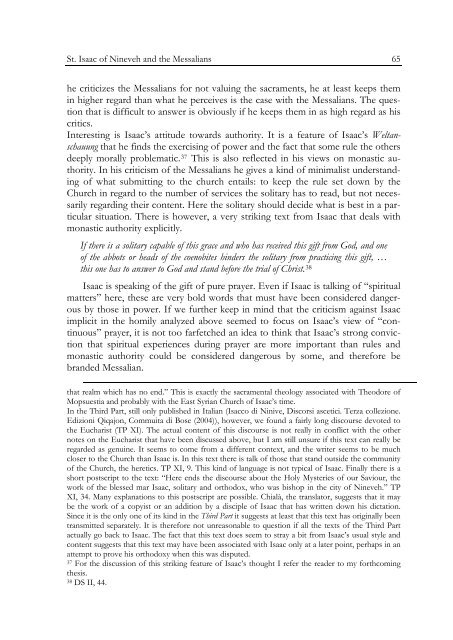Mystik - Metapher - Bild - Oapen
Mystik - Metapher - Bild - Oapen
Mystik - Metapher - Bild - Oapen
Erfolgreiche ePaper selbst erstellen
Machen Sie aus Ihren PDF Publikationen ein blätterbares Flipbook mit unserer einzigartigen Google optimierten e-Paper Software.
St. Isaac of Nineveh and the Messalians<br />
he criticizes the Messalians for not valuing the sacraments, he at least keeps them<br />
in higher regard than what he perceives is the case with the Messalians. The question<br />
that is difficult to answer is obviously if he keeps them in as high regard as his<br />
critics.<br />
Interesting is Isaac’s attitude towards authority. It is a feature of Isaac’s Weltanschauung<br />
that he finds the exercising of power and the fact that some rule the others<br />
deeply morally problematic. 37 This is also reflected in his views on monastic authority.<br />
In his criticism of the Messalians he gives a kind of minimalist understanding<br />
of what submitting to the church entails: to keep the rule set down by the<br />
Church in regard to the number of services the solitary has to read, but not necessarily<br />
regarding their content. Here the solitary should decide what is best in a particular<br />
situation. There is however, a very striking text from Isaac that deals with<br />
monastic authority explicitly.<br />
If there is a solitary capable of this grace and who has received this gift from God, and one<br />
of the abbots or heads of the coenobites hinders the solitary from practicing this gift, …<br />
this one has to answer to God and stand before the trial of Christ. 38<br />
Isaac is speaking of the gift of pure prayer. Even if Isaac is talking of “spiritual<br />
matters” here, these are very bold words that must have been considered dangerous<br />
by those in power. If we further keep in mind that the criticism against Isaac<br />
implicit in the homily analyzed above seemed to focus on Isaac’s view of “continuous”<br />
prayer, it is not too farfetched an idea to think that Isaac’s strong conviction<br />
that spiritual experiences during prayer are more important than rules and<br />
monastic authority could be considered dangerous by some, and therefore be<br />
branded Messalian.<br />
that realm which has no end.” This is exactly the sacramental theology associated with Theodore of<br />
Mopsuestia and probably with the East Syrian Church of Isaac’s time.<br />
In the Third Part, still only published in Italian (Isacco di Ninive, Discorsi ascetici. Terza collezione.<br />
Edizioni Qiqajon, Commuita di Bose (2004)), however, we found a fairly long discourse devoted to<br />
the Eucharist (TP XI). The actual content of this discourse is not really in conflict with the other<br />
notes on the Eucharist that have been discussed above, but I am still unsure if this text can really be<br />
regarded as genuine. It seems to come from a different context, and the writer seems to be much<br />
closer to the Church than Isaac is. In this text there is talk of those that stand outside the community<br />
of the Church, the heretics. TP XI, 9. This kind of language is not typical of Isaac. Finally there is a<br />
short postscript to the text: “Here ends the discourse about the Holy Mysteries of our Saviour, the<br />
work of the blessed mar Isaac, solitary and orthodox, who was bishop in the city of Nineveh.” TP<br />
XI, 34. Many explanations to this postscript are possible. Chialà, the translator, suggests that it may<br />
be the work of a copyist or an addition by a disciple of Isaac that has written down his dictation.<br />
Since it is the only one of its kind in the Third Part it suggests at least that this text has originally been<br />
transmitted separately. It is therefore not unreasonable to question if all the texts of the Third Part<br />
actually go back to Isaac. The fact that this text does seem to stray a bit from Isaac’s usual style and<br />
content suggests that this text may have been associated with Isaac only at a later point, perhaps in an<br />
attempt to prove his orthodoxy when this was disputed.<br />
37 For the discussion of this striking feature of Isaac’s thought I refer the reader to my forthcoming<br />
thesis.<br />
38 DS II, 44.<br />
65

















